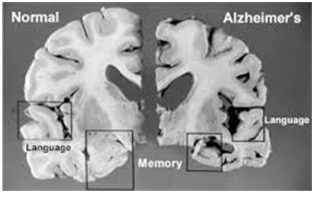
Definition : It is a chronic mental disorder in which disturbance of multiple high cortical function & characterizd by impairement of memory
It is disorder of brain deterioration involve a gradual loss of intectual ability & normal function
Etiology
1 degeneration brain disorder
Alzheimer disease
Parkinson disease
Huntington disease
2 vascular diseases
Stroke infarction
3 drugs
Bromide
Alcohol
4 brain pathology
Trauma
Viral infection
Chronic meningitis
Sign symptom
Recent memory loss: Difficulty completing familiar tasks – for example, making a drink or cooking a meal,
Problems communicate: difficulty with language by forget simple words or using the wrong ones.
Confusion : with time and place, person,
Problems with abstract thinking: for example, selling with money.
Misplace things: about including put them in the wrong places and forgetting doing this.
Mood changes – distinct those we all have, swinging quickly through a set of moods.
Personality changes – becoming irritable, suspicious or fearful,
Loss of initiative – performance less interest in starting something or going somewhere.
Type
1 Alzheimer dementia : it is most common form of both senile & pre senile dementia that chaterized by tangled clump & disintegration of nerve of cell of frantal & temporal lobe cerebral cortex it lead to memory lpses , confusion & physical mental deterioration
2 vascular dementia: it also known as multiple infraction dementia cause by minor stroke
It onset abrupt & worsens condition the relative area affect like intectual function decrease memory abstracts judgment & impulse control
3 Parkinson disease : it characterization by progressive deterioration of intellectual ability tremor mask like face appearance due to dopamine deficiency
Difference between dementia & delirium
DEMENTIA DELIRIUM
COMMON SIGNS Signs include forgetfulness and confusion disorientation. Signs include apparent quiet, sleepy and confused, or agitated and very distressed. Sleeping disturbed.
WHEN SIGNS APPEAR Slow change in mental state and behavior over months or years. Sudden change in mental state and behavior over hours or days.
THINKING AND ATTENTION They may frequently seem confused. Over time, the person’s thinking will not be reasonable or rational. As the disease worsens, they will not be capable to focus well. They will often not be able to talk with or know others clearly. In some cases, they may see or hear things that others can’t (hallucination). They will not be able to remember events that just happen, and lose memory of events in the past. They may not remember who people are, or where they are. They may not be familiar. They may be confused and unsettled. They may have trouble focusing and talking with others. It is likely that they will not be able to tell a health care supplier about their symptoms. They may see or hear things that other can’t (hallucinations). They may not be able to remember something that just happens.







